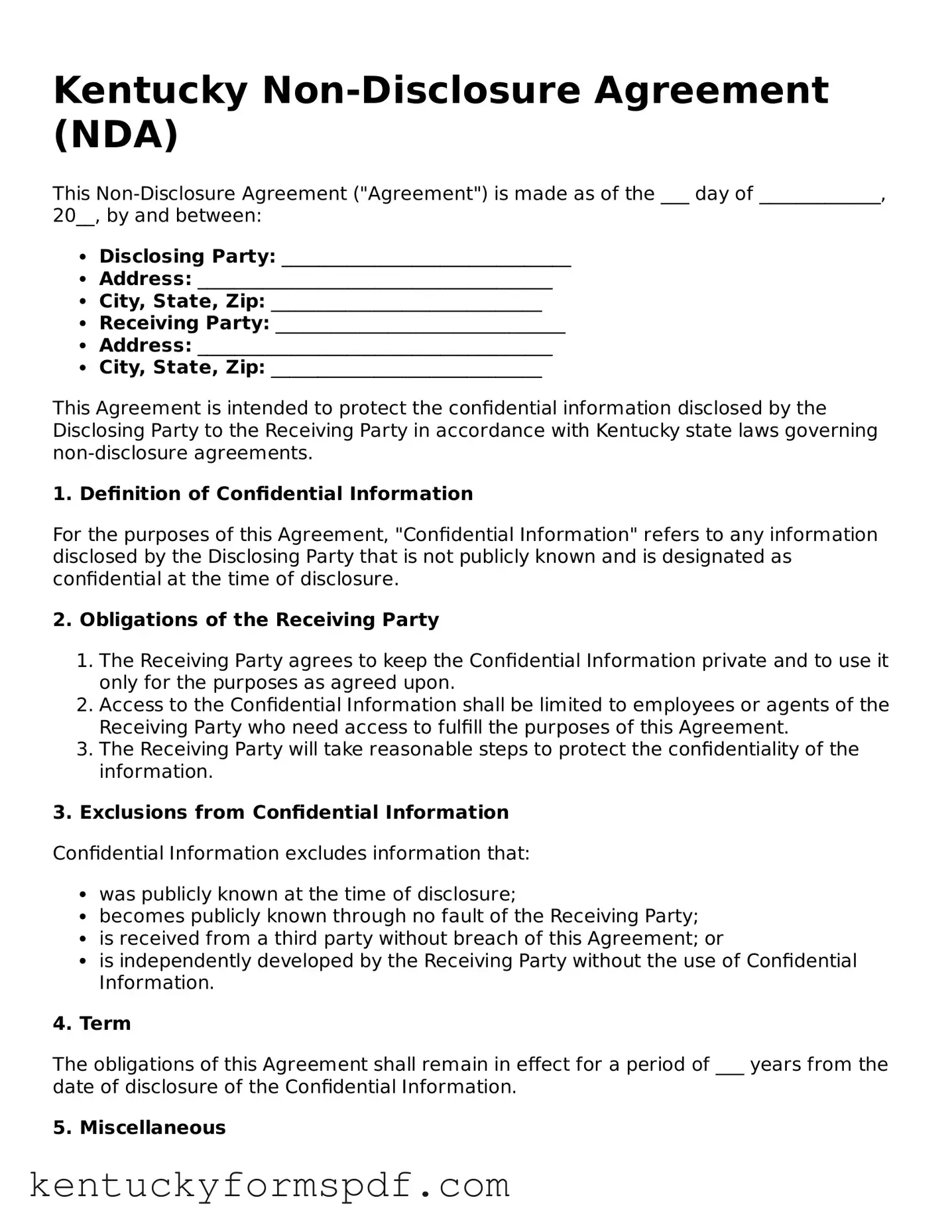What is a Kentucky Non-disclosure Agreement (NDA)?
A Kentucky Non-disclosure Agreement is a legal contract designed to protect confidential information shared between parties. It ensures that sensitive information, such as business strategies, client lists, or proprietary technologies, is not disclosed to unauthorized individuals or entities. This agreement is crucial for businesses looking to safeguard their intellectual property and maintain a competitive edge.
Who typically uses a Kentucky NDA?
Businesses, entrepreneurs, and individuals often use NDAs in various situations. For example, companies may require employees, contractors, or partners to sign an NDA before sharing confidential information. This helps protect trade secrets and ensures that sensitive information remains secure during collaborations or negotiations.
What should be included in a Kentucky NDA?
A well-drafted Kentucky NDA should include several key elements. These include a clear definition of what constitutes confidential information, the obligations of the parties regarding that information, the duration of the confidentiality obligations, and any exclusions (such as information already in the public domain). Additionally, it should outline the consequences of breaching the agreement.
How long does the confidentiality last under a Kentucky NDA?
The duration of confidentiality obligations in a Kentucky NDA can vary. Typically, the agreement will specify a time frame, which may range from a few years to an indefinite period, depending on the nature of the information. It is important for parties to agree on a reasonable duration that reflects the sensitivity of the information involved.
Can an NDA be enforced in Kentucky?
Yes, NDAs can be enforced in Kentucky, provided they are properly drafted and executed. Courts generally uphold NDAs as long as they are reasonable in scope and duration, and do not impose undue restrictions on a party's ability to work or compete. If a breach occurs, the aggrieved party may seek legal remedies, including damages or injunctive relief.
What happens if someone breaches a Kentucky NDA?
If a party breaches a Kentucky NDA, the injured party may pursue legal action. This could involve seeking monetary damages for any losses incurred as a result of the breach. Additionally, the court may issue an injunction to prevent further disclosure of the confidential information. The specific remedies available will depend on the terms of the NDA and the nature of the breach.
Can I modify a Kentucky NDA after it has been signed?
Yes, parties can modify a Kentucky NDA after it has been signed, but any changes must be agreed upon by all parties involved. It is advisable to document any amendments in writing and have all parties sign the revised agreement. This helps ensure that everyone is on the same page regarding the updated terms.
Is a Kentucky NDA the same as a Non-compete Agreement?
No, a Kentucky NDA and a Non-compete Agreement serve different purposes. An NDA focuses on protecting confidential information, while a Non-compete Agreement restricts an individual from working in a competing business for a certain period after leaving a job. Both agreements can be used together, but they address distinct legal concerns.
Are there any limitations to what can be protected under a Kentucky NDA?
Yes, there are limitations. Not all information can be protected under a Kentucky NDA. For example, information that is already public knowledge, independently developed, or disclosed by a third party without a confidentiality obligation cannot be protected. It is important to clearly define what information is confidential in the NDA.
Do I need a lawyer to draft a Kentucky NDA?
While it is possible to draft a Kentucky NDA without legal assistance, consulting with a lawyer is highly recommended. An attorney can ensure that the NDA complies with state laws, addresses specific needs, and minimizes the risk of enforceability issues in the future. Legal guidance can be invaluable in creating a robust and effective agreement.

